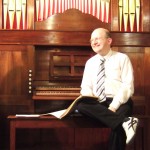FAIRLIGHT HALL FESTIVAL 15 June
Tae-Hyung Kim, star prizewinner of last March’s Musical Festival Piano Concerto Competition, on June 15 paid a return visit to Hastings with a sell-out performance in the idyllic setting of the home of David & Sarah Kowitz, Fairlight Hall.
Kim, as he is informally known, was ‘discovered’ as a youthful prodigy in 2000,.and in the years since has combined professional performances with studies to extend his repertoire. Those who heard his signature performance at the White Rock with the Royal Philharmonic Orchestra of Beethoven’s Emperor Concerto will agree it was memorable.
On Saturday Kim played solo piano works by composers from the seventeenth century Domenico Scarlatti to the twentieth century Erik Satie.
His opening choice was probably the most familiar, Debussy’s two delightful Arabesques, pieces frequently heard as encores but here Kim showed they more than deserve a hearing of their own.
Scarlatti contributed three of his five hundred and fifty (yes!) Sonatas. Scarlatti was a celebrated harpsichordist, and Kim adapted his approach to mirror this.
The first half closed with movements from Prokofiev’s Romeo & Juliet ballet, The Young Juliet, and that favourite of TV researchers for something ‘heavy’, the theme portraying the feuding of the lovers’ families The Montagues and Capulets.
Franz Liszt, oft lauded as the greatest pianist of all time, transcribed many other composers’ works. Kim opened the second half with three such pieces by Schubert arranged by Liszt, followed by five of Liszt’s original studies. This afforded Kim the opportunity to, reveal his range from a serene Prelude to a ‘fast and furious’ Molto vivace, the grace of dancers whirlting around the ballroom in ‘Ricardanza’, ending with the gentle charm of Evening Harmonies.
With the audience demanding more Kim obliged with one further example of his skill. However for many the most memorable moment of this delightful performance may be the simple melody of Erik Satie’s excursion on to the dance floor, the haunting yet joyous Valse Je te veux.
The audience included the Hastings Musical Festival Director Prof. Frank Wibaut, the distinguished pianist Peter Katin and representatives of Councils throughout East Sussex, who universally expressed their delight at this unique presentation in such an attractive setting. Dr Katin summed up the opinion of so many when he said, off the cuff, ‘I cannot remember when I was so moved by a performance.’ Marrion Wells


